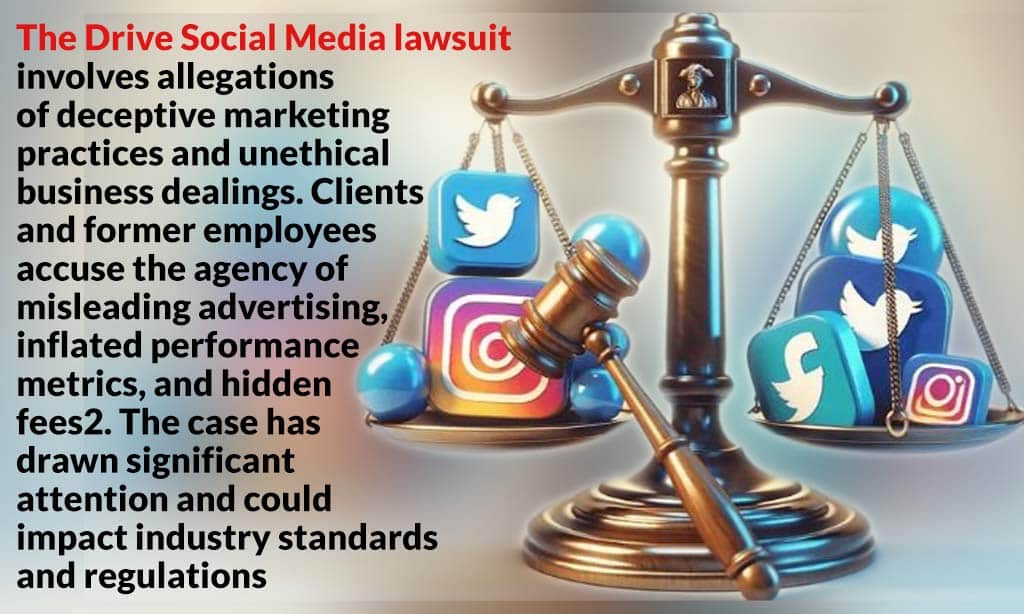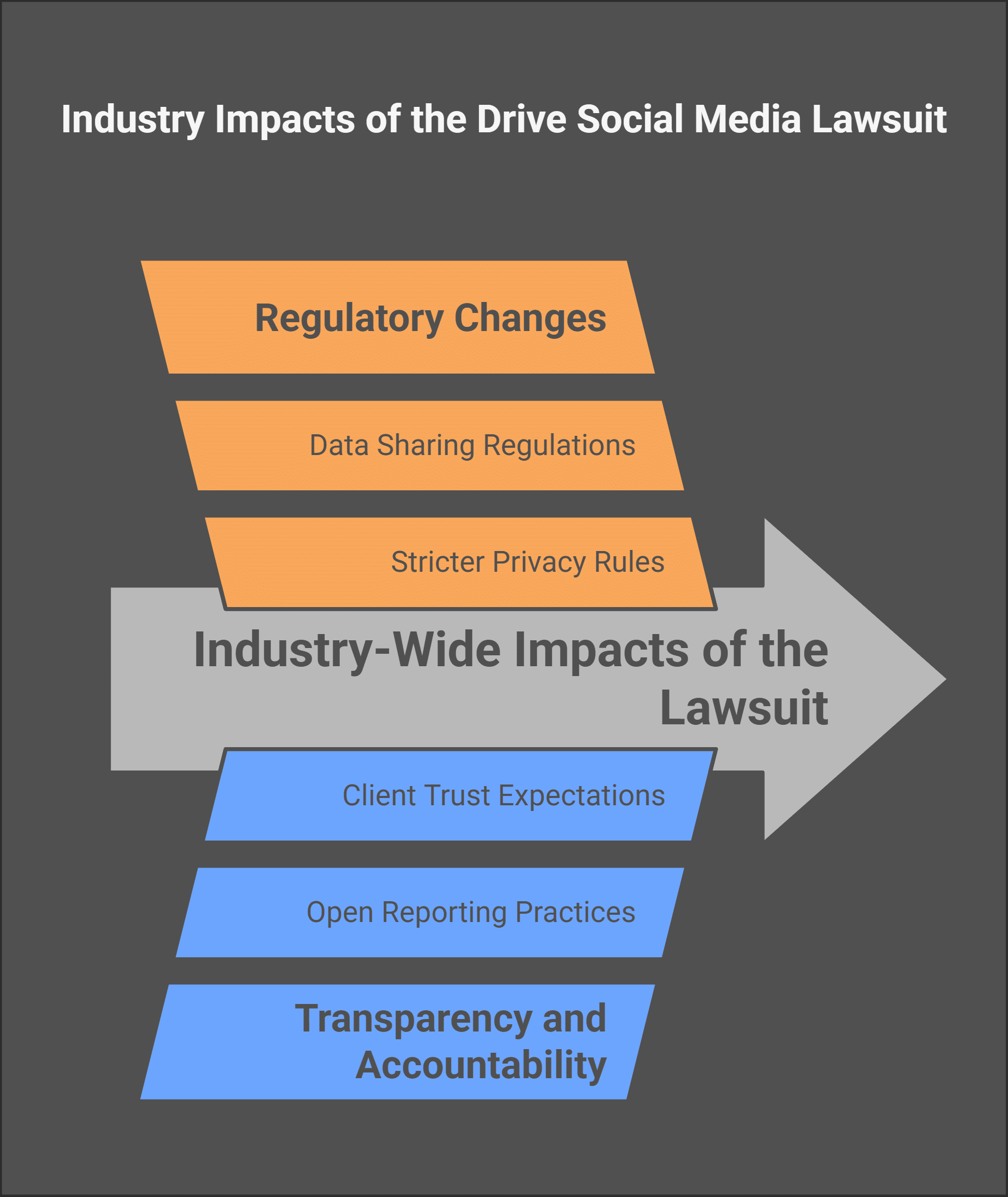Picking the right digital marketing partner is tricky. With so many agencies promising big results, it’s hard to know who to trust. Now, with the drive social media lawsuit making headlines, you might be even more unsure.
This lawsuit has caught attention because it touches on real worries—like honest advertising and paying workers fairly.
Drive Social Media is in hot water over several serious charges. They said they were really good at online campaigns and treating their teams right but now face claims of not living up to those promises.
Our blog will take a close look at what’s going on here—from what the company did wrong to how they’re answering back.
Read on drive social media lawsuit for the facts and what this means for businesses everywhere. Stay informed!
Key Allegations in the Drive Social Media Lawsuit
The Drive Social Media lawsuit has caught attention for several serious claims. Workers said they didn’t get paid what they earned, and the company is accused of not being honest about social media numbers and breaking promises in agreements.
Unpaid wages and labor violations
Some former employees have spoken out. They say they did not get paid for working extra hours. They also didn’t get breaks. There were issues with their pay too. This is against labor laws.
The problems include unpaid wages and unsafe work places. People should get paid for all the time they work. They should also have a safe place to work in.
Labor laws protect workers. They make sure people get fair pay and safe jobs. When companies break these laws, it’s a big problem.
Misrepresentation of social media metrics
Drive Social Media got caught faking numbers. They said campaigns did really well when they didn’t. This breaks FTC rules. The FTC doesn’t like it when companies lie in ads or about data.
Manipulating data made Drive’s services seem better. Clients thought they were getting more for their money than they really were. This is called deceptive advertising and is against the law.
Clients lost trust because of these lies. Many businesses now check digital marketing agencies more carefully. They want to make sure their money is used right.
Breach of contract claims
After looking into the issues with social media metrics, concerns about breaking contracts came next. Clients said Drive Social Media did not do what they agreed to in their deals.
They shared that they saw little or no gain after spending a lot of money. This is known as a breach of contract. It means not following the agreed terms.
People expected certain results from their marketing strategies on platforms like Facebook and Instagram but got disappointing outcomes instead. The failure to meet these expectations led to many complaints against the company for not sticking to contractual agreements—an essential part of contract law and business ethics.
Drive Social Media’s Response to the Allegations
Drive Social Media quickly said they did nothing wrong. Their spokespeople shared their side, clearly denying the claims made against them.
Denial of wrongdoing
Drive Social Media said they did nothing wrong. They think the problems are because of changes in how social media works, not what they did. The company believes these outside factors hurt their results.
They also said that they always followed the rules. Drive Social Media wants to show everyone that they can be trusted.
Next, we will look at what the company said exactly about these claims.
Statements from company representatives
Company people say they did nothing wrong. They talk about how clients could always look at marketing data and rules. The company, located in St. Louis, knows a lot about digital ads, SEO, handling social media, and looking at numbers.
They also said their work follows industry standards. This means they keep things clear with no hidden fees or misleading ads. Their goal is to help clients grow on platforms like Google and TikTok without breaking any rules.
The team works hard to meet customer needs while sticking to laws like the Children’s Online Privacy Protection Act. They focus on making sure everything they do online is fair and follows the law.
Implications of the Lawsuit on Businesses
The lawsuit against Drive Social Media brings big worries for companies. It makes them think about who they trust with their online advertising and watch out for hidden problems in those partnerships.
Loss of trust in digital marketing agencies
Businesses are now thinking hard before they use marketing agencies. This is because many worry about the ethics of these companies. They fear partners might not be honest. This makes trust in digital marketing go down.
People used to rely on these agencies a lot. Now, they watch more closely and ask more questions. They want to make sure everything is right before they agree to work together.
Financial repercussions for clients
Losing trust in digital marketing agencies leads to more than just doubts. Clients of Drive Social Media may face big money losses. They had stopped projects and lost their budgets for big plans.
Now, they must deal with financial penalties too. They need to pay back complainants and give back lost funds.
This problem hurts the clients’ pockets deeply. It’s not just about paying fines. The halt on projects means wasted time and resources that were meant to grow businesses through social media strategies and campaigns.
With these actions halted, there’s no return on investment (ROI) to speak of, hitting clients hard financially.
These costs show how important it is for clients to pick their digital marketing partners carefully. Wrong choices can lead to serious financial issues down the line, affecting long-term growth and stability.
Increased scrutiny of industry practices
The Drive Social Media lawsuit has made businesses more careful. They now look closer at digital marketing agencies’ actions. This lawsuit shows the need for clear ethics and transparency in advertising.
It leads to questions about how social media metrics are shown and if they can be trusted.
As this case moves forward, businesses might face new rules from places like the Federal Trade Commission (FTC). These rules would aim to stop misleading advertising and ensure fair labor standards are met.
This change means that all marketing agencies must be very honest in how they report success to their clients.
For digital marketing, being truthful with numbers becomes even more important. Companies will have to make sure they follow these stricter guides closely or risk legal trouble themselves.
Legal Developments and Updates
The Drive Social Media lawsuit is moving through the courts, with both sides preparing their cases. Keep an eye out to learn where this leads!
Current status of the case
The FTC filed this lawsuit against Drive Social Media in late 2022 in the U.S. District Court for the Eastern District of Missouri. This case is still moving forward, with both sides sharing motions and evidence.
Each party is trying hard to show their side of the story. Judges are looking at all details carefully.
Now lawyers and judges are busy with the case. They go through many documents and listen to what everyone has to say. Soon, they will decide how to move on with legal steps that could change how digital marketing works.
Potential outcomes of the legal proceedings
The court case could lead to big fines for Drive Social Media. They might have to pay people who complained and give back lost money. This would hit their bank account hard. Also, they may need to change how they work to follow ethical rules better.
If the court finds them guilty, their name will get hurt, and they could lose customers. People might not trust digital marketing agencies as much anymore. This means other businesses could think twice before hiring an agency like Drive Social Media.
Lessons for Businesses from the Drive Social Media Lawsuit
The Drive Social Media lawsuit teaches companies to always check their contracts and the work of their digital marketing partners closely. This step can help avoid trouble later. Keep reading for more insights on protecting your business in the digital world.
Importance of contract clarity
Clear contracts help both sides know what to expect. They list tasks, payments, and rules in simple language. This way, everyone agrees and understands from the start. Clear agreements also prevent misunderstandings about social media strategies or marketing ethics.
Having everything written down makes solving problems easier if something goes wrong. If a digital marketing agency does not do what it promised, the contract shows what was agreed upon.
It is crucial for protecting your brand image and ensuring that you get the social media management you paid for without hidden fees or deceptive advertising.
Conducting due diligence before hiring agencies
Check an agency’s past work and reputation before hiring them. Look at reviews and talk to past clients. You want to make sure they follow through on promises and don’t have hidden fees.
It is key to vet marketing providers for honesty.
Make sure the agency fits what you need in digital marketing. Ask about how they deal with social media platforms and keep up with industry standards. Clear contracts help avoid problems like breach of contract later.
Always monitor their work closely once hired.
Monitoring service deliverables regularly
After picking the right agency, watching over service deliverables often is key. It ensures that digital marketing efforts match what was promised in contracts. Regular checks help spot issues early.
This way, businesses can avoid problems like misleading statements or unethical practices.
Demanding detailed performance reports is a must. These reports show if strategies meet targets. They also highlight how well social media platforms are used to reach audiences. Plus, conducting compliance audits regularly keeps practices ethical and within legal bounds.
This approach protects businesses from surprises down the line. It ensures that partnerships with agencies bring real value and keep customer trust strong.
Industry-Wide Impacts of the Lawsuit
The lawsuit against Drive Social Media might push for new laws. Everyone in the field could have to be more open and careful.
Potential regulatory changes
New rules may come for digital marketing. These changes aim to make things clearer and fairer. The lawsuit against Drive Social Media has shown we need better standards. This means companies might have to show their work more openly.
They could also face stricter checks on how they treat workers and protect privacy.
The Federal Trade Commission (FTC) is watching this closely. They want to stop deceptive advertising and unfair business acts. So, social media companies might have to change how they share data or advertise products.
This could help customers trust digital marketing more. It’s a big step toward making sure everyone plays by the same rules online.
Increased focus on transparency and accountability
The Drive Social Media lawsuit shows us a big need for clear truths and right actions in digital marketing. Now, more people want agencies to be very open about what they do and how well their ads work.
It’s important because clients trust these agencies with their brands and money. They expect honest reports on social media metrics without any hidden tricks.
This shift means that digital marketing firms must follow rules like the Federal Trade Commission’s guidelines closely. They also have to make sure contracts are easy to understand.
This helps avoid problems over things like deceptive advertising or breach of contract claims. Clients are now double-checking the work of these agencies more often.
Next, let’s look at how businesses can protect themselves from similar issues.
Key Takeaways for Businesses
Businesses should learn to shield themselves from similar issues. They must follow steps to keep up with rules in digital marketing ties.
Protecting against similar disputes
To avoid legal issues like the Drive Social Media lawsuit, companies must be smart. One way is by being clear in contracts. This means writing down every detail about what both sides will do.
It helps stop misunderstandings later on.
Companies should also check everything before working with marketing agencies. They can look at past work and talk to other clients. This step makes sure the agency does good work and follows laws.
Last, it’s important for businesses to watch how their projects are going. They should not just wait until the end to see results. Checking often keeps everyone honest and on track.
Steps to ensure compliance in digital marketing partnerships
Make sure all deals are clear and in writing. This means having contracts that lay out what each side will do. Also, demand regular reports on how the marketing is working. These should show real numbers to prove if goals are being met.
Do audits often to check if rules and ethics are followed. This helps catch any problems early. If issues come up, solving them quickly keeps both sides safe from bigger troubles.
Next, we talk about the impact of lawsuits on companies’ reputations.
Takeaways
The Drive Social Media lawsuit tells us a lot. It shows problems like not paying workers, lying about social media numbers, and breaking deals. The company says it did nothing wrong.
This case could change how digital marketing works. It reminds businesses to check contracts and keep an eye on their marketing help. How will this affect your choice in digital helpers? Could this lead you to ask more questions or seek clearer deals?
This drive social media lawsuit might make rules tighter for all marketing groups. It stresses honest ads and fair business acts. Think about being open and straight in your own work. This story pushes us to aim for trust and clear communication in business.




































